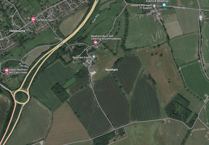THE latest twist in the long-running planning saga which threatens to engulf a small Surrey village with 1,800 homes, shops, a school, community centre, care home health centre and numerous other facilities has come under a new attack.
The development at Dunsfold Park, site of the former World War II aerodrome, which is famed for its filming of BBC TV’s Top Gear, has produced a steady stream of objections to an outline planning application on one of the most controversial sites in the history of Waverley Borough Council.
Now the Environment Agency has put a spanner in the works after it objected to the application because of its concerns over the loss of the flood plain caused by a proposed main access road.
An EA spokesman said this week: “In the absence of an acceptable flood risk assessment, we object to the application and recommend refusal of planning permission.”
The Environment Agency gives its reasons for objecting to the scheme – due to come before planners next month – after claiming a flood risk assessment carried out last year by the developers did not comply with the rules.
The agency submission said “It does not provide a suitable basis for an assessment to be made of the flood risk arising from the proposed development.”
The agency has advised the developers that to overcome its objections they would need to submit a new assessment which covers the “deficiencies highlighted” and “demonstrates the development will not increase flood risk elsewhere and where possible reduces flood risk overall”.
And it warned the production of an FRA would not itself result in the removal of an objection.
Also objecting to the scheme in its current form is Natural England, the government’s adviser for the natural environment, which said, there was a “potential for a significant impact on the Surrey Hills Area of Outstanding Natural Beauty.”
The report goes on to say the proposed development would be “visible at least in part from several prominent locations along public pathways within the AONB”.
It also considered the scale of the proposed development and its proximity is out of character with the surrounding landscape.
Among other organisations to make their feelings known are Surrey Police who question the extra burden it would put on their resources and have called for contributions towards the costs of policing the proposed huge new settlement.
In its letter of objection last month, Chiddingfold Parish Council said the site was “poorly located” and was also concerned about additional traffic and severe knock-on effects on its rural infrastructure and narrow country lanes, which make up most of its transport links.
The parish council considered it to be unsustainable “without huge and uneconomic investment in the transport infrastructure”.
It also objected to the application before the publication, public consultation and approval of Waverley’s local plan and before any public consultation has taken place over its transport assessment produced by consultants Mott McDonald.
The latest outcry comes after a meeting earlier this year when Waverley came under attack from eight parish councils for conducting what they claimed was a consolation process which was not fit for purpose.
Gerry Forristal, from Dunsfold Park, said in a statement this week: “The planning process is ongoing and Dunsfold Park are working with consultees who have submitted initial responses to the application, including the Environment Agency, Natural England and Surrey Police. Further technical material relating to the flood risk assessment has been submitted to the Environment Agency, and further information on landscape impact will be discussed with Natural England.
Surrey Police have requested a financial contribution from the development and this is also being discussed. These ongoing discussions will be reflected in final consultee responses to the application.”
Previous development plans for Dunsfold Park included an application for 2,600 homes which was turned down by a Government planning inspector on appeal in 2009.



